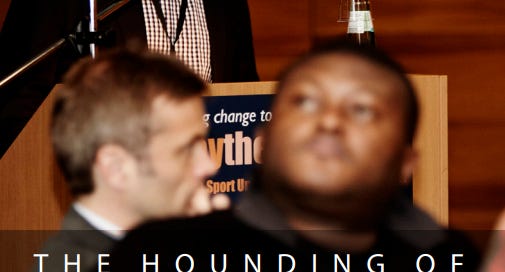The Hounding of Roger Pielke Jr.
A journalist recently contacted me to ask about what happened after I was investigated by a member of Congress. Here is what I told her.
In 2015, a member of Congress, Rep. Raul Grijalva (D-AZ) initiated a very public investigation of me. Mr. Grijalva suggested that I may have been taking money from Exxon or other fossil fuel companies, because he disagreed with my invited Congressional testimony in my areas of expertise. In the subsequent investigation I was cleared by the University of Colorado Boulder of all of Mr. Grijalva’s allegations and insinuations. Of course I was.
But even so, the Grijalva investigation and its fallout dramatically altered my career ever since. Perhaps that was the point. In the five years since, no one – on or off my campus – has asked me how things are going in the aftermath of the investigation and its quite visible impacts on my work.
Well, that is until a few weeks ago when a journalist contacted me about my experiences since Grijalva. I answered her queries honestly and openly, and her report has just been published. Regrettably and inexplicably, when contacted by that same journalist, official spokespeople on my campus did not do the same.
Being viciously hounded in public and private for 15 years by politicians, activists, and a few scientists and academic peers is no fun. It also leads to feelings of embarrassment and shame, which seem inappropriate, but yet are still there. The utter lack of institutional support has been at times frustrating, saddening, depressing – and ultimately, it is just the way that it is. Acceptance is where I am at today.
In a recent essay in The Atlantic, Anne Applebaum well characterized what happens to professors who fall out of favor for their views:
“Here is the first thing that happens once you have been accused of breaking a social code, when you find yourself at the center of a social-media storm because of something you said or purportedly said. The phone stops ringing. People stop talking to you. You become toxic.”
Political scientist Eve Seguin of the University of Quebec coined a phrase to describe what happens when a university turns on what administrators decide is a “troublemaker” member of its own faculty -- “academic mobbing.” Much of what Applebaum and Seguin write about resonates with my experiences.
And yet, to be absolutely clear, I told the reporter who recently contacted me that despite it all, I am continuing to focus on teaching excellent classes and doing important, influential research:
“My experiences show that they cannot cancel me. They can certainly make my professional life uncomfortable – on and off campus -- and for whatever reasons. But I have an incredible position from which I can engage science, policy and politics with ideas, arguments and research and there are many around the world willing to listen and engage. For now, I’m up for the challenge. From where I sit today, I wouldn’t change a thing. I am optimistic and grateful for this opportunity.”
It has been quite a ride. You can read about it here.





I came across Roger Sr's work many years ago, in my quest to understand this climate issue. Through that your name came up (a fortunate effect of early google algorithms), and I have followed your contributions in the field of climate and disasters ever since.
Thank you for you continued efforts, know that they are important for very many people. You set a standard of integrity that invokes recognition and respect.
Dr. Pielke, My heartiest congratulations on weathering the storm for so long -- I have weathered storms at sea that seemed like they would never end, but do eventually and am personally dealing with a Cancel Culture attack (writ small, but still very upsetting). I am awed by your strength of character.
You are a role model for so many young scientists who daily have to make the decision to either stand fast for their honest scientific findings or to "go along to get along".
Thank you.
Kip Hansen